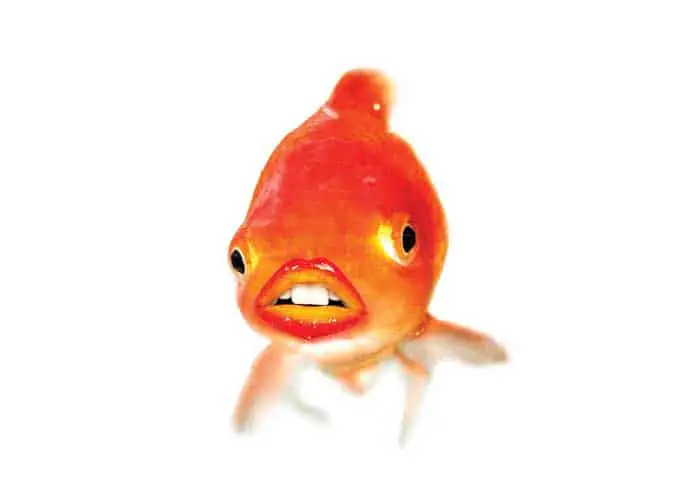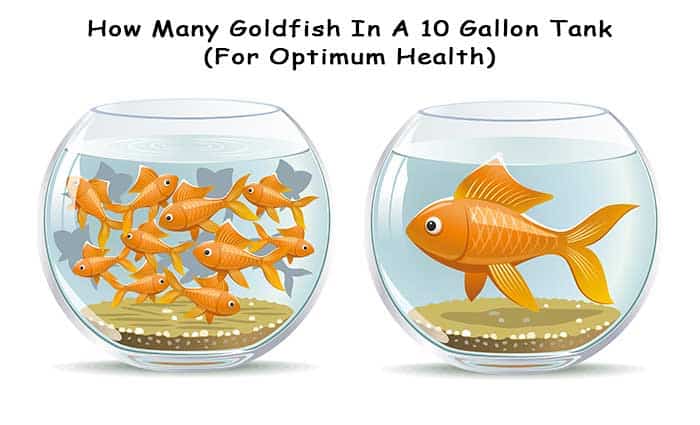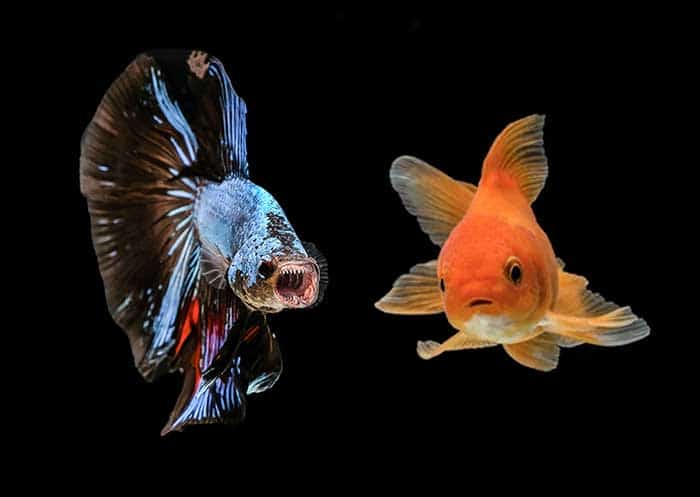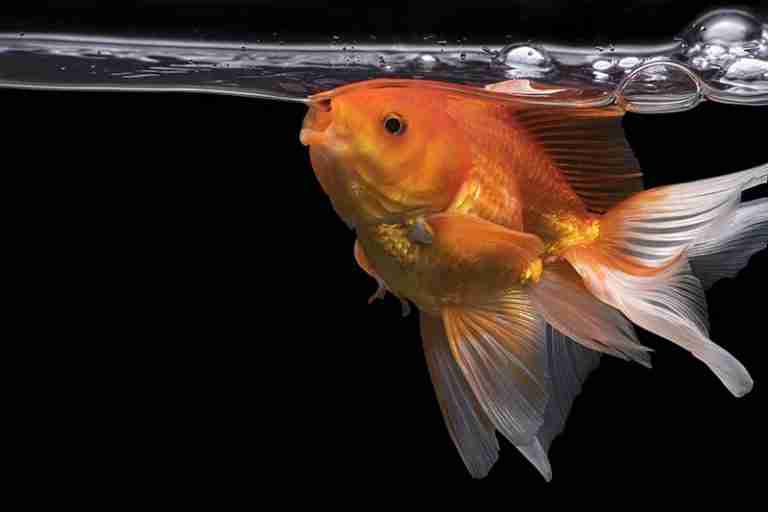Water Temperature For Goldfish (Aquarium and Ponds)
Goldfish are known to live in aquariums and outdoor ponds at various temperatures, which leads to the question, “Are goldfish warm water or cold water fish?” and “What’s the ideal water temperature for goldfish?”
The ideal water temperature for goldfish is 68 to 74°F (20 to 23°C), but they can live comfortably in temperatures from 50 to 80°F (10 to 26°C). Warmer water temperatures will cause goldfish to grow faster but shorten their life span.
Goldfish can survive in cold water, but they will become sluggish and eat less when the temperature is below 60 degrees Fahrenheit.
So we can see that goldfish can cope with a range of temperatures, so can they live in an outdoor pond in winter, and should you put a heater in your aquarium?
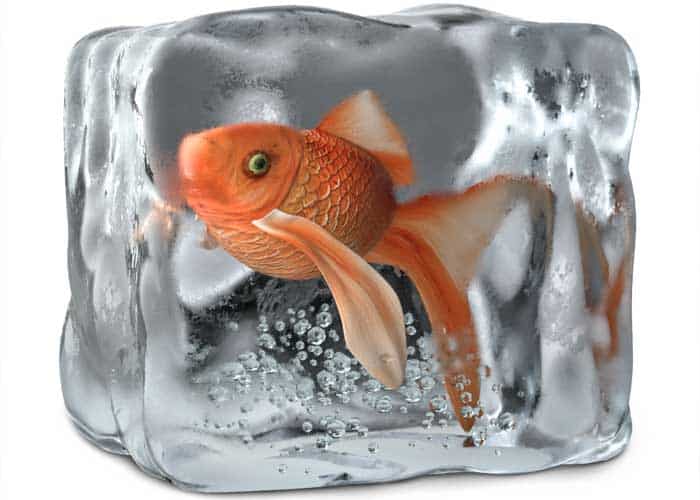
The rest of this article will answer the most common questions from fishkeepers that either own goldfish or those about to buy some goldfish.
If you have an interest in goldfish, why not check out the articles below:
How Long Do Goldfish Live (Tank, Bowl & Pond Comparison)
Do Goldfish Need An Air Pump To Help Them Breathe
Do Goldfish Have Teeth (All your questions answered)
How many goldfish in a 10 gallon tank
Can Goldfish Live In Warm Water?
Goldfish are coldwater fish known to be very hardy, especially concerning water temperature. Goldfish can live in a wide range of water temperatures and are often found in home aquariums with warm water fish.
Maintaining a consistent water temperature is more important for goldfish as sudden changes can result in stress, often leading to disease.
Goldfish are among the best fish for community tanks. With the wide variety of species available, it is sometimes difficult to know which types do better in a warm water aquarium.
Although goldfish are lovely, playful creatures, they can often look quite bland in relation to many species of tropical freshwater fish, which is why the “Fancy Goldfish” is becoming so popular.
Just the name “Fancy Goldfish” implies something a little different about them. Fancy goldfish are selectively bred to produce a variety of unusual features and colors, such as fantails, large bulging eyes, and unusual body shapes.
Fancy goldfish are a more suitable variety for warm-water community aquariums because selective breeding often makes these fish more susceptible to temperature swings and certain illnesses.
The common goldfish, which is much slimmer, is more closely related genetically to wild goldfish and survives much better in varying conditions.
Fancy goldfish can live outdoors in a pond but will not do as well as common goldfish, especially when temperatures drop in the winter.
If you want to watch a short video on Fancy Goldfish water temperature, I found one below on Youtube.
How Warm Should Goldfish Water Be?
You should try to maintain the water temperature in your aquarium at 68 to 74 degrees Fahrenheit if you want your goldfish to live a long and healthy life. Water temperatures that are too cool or too warm can cause health problems for your fish. A simple aquarium thermometer will help you to monitor your goldfish water temperature.
Common and fancy goldfish can survive in colder or warmer water, but they will be healthier and happier in an environment where the temperature is within their ideal range.
If you keep goldfish in an outdoor pond, they will be more tolerant of fluctuating water temperatures than if they are kept in an aquarium.
What Temperature Should A Fish Tank Be For Goldfish?
The ideal temperature of a fish tank should not only suit goldfish but will need to suit any other fish in the tank.
If your fish tank only contains goldfish, then the temperature should stay within the ideal range of 68 to 74°F that I have already mentioned.
Warm water naturally contains less oxygen, so if the water becomes too warm, you may notice your goldfish gasping at the surface when oxygen levels are richer.
Oxygen enters the water at the surface, so the larger the surface area, the more oxygenated your tank water. Where possible, try not to keep your goldfish in a tall narrow tank with a small surface area.
The ideal goldfish tank will be spacious, providing plenty of swimming room to keep your fish healthy and happy. Goldfish have always been portrayed as happy little creatures that live in small bowls, but this is not a healthy environment and would be susceptible to temperature swings and poor water quality, especially if kept in direct sunlight throughout the day.
If you keep your goldfish indoors, you will need to keep it away from direct sunlight, which will heat a goldfish bowl very quickly and lead to warmer temperatures than goldfish can tolerate. When water temperatures rise, the amount of dissolved oxygen will fall. In a small tank with little oxygen to begin with, this can be devastating.
Do Goldfish Need A Heater?
Goldfish don’t need a heater, although they may benefit from an aquarium heater if the water temperature falls below the optimal range.
Even though goldfish can live in a wide water temperature range, they don’t like sudden temperature changes. When the water temperature changes suddenly, it can cause a stress reaction known as goldfish temperature shock.
The benefit of using an aquarium heater is the adjustments you can gradually make until you have reached the correct water temperature. The tank water will then remain at a constant temperature.
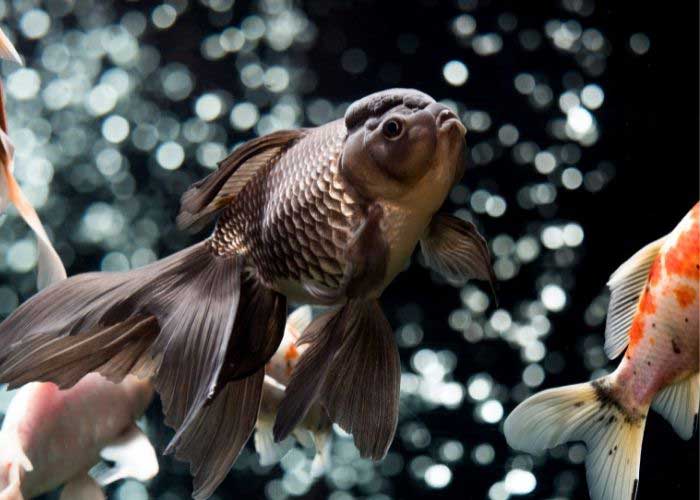
What Is Goldfish Temperature Shock?
Goldfish temperature shock occurs when the water temperature changes suddenly (even by just 2 degrees). Temperature shock in goldfish will cause stress and may lead to swim bladder disorder or a variety of other illnesses.
Temperature shock in goldfish can be easily avoided, especially by using a heater to maintain the water temperature at the desired setting.
Temperature shock can occur more quickly in a smaller body of water, such as an aquarium or a small pond. Deeper, larger ponds will hold their temperature better, resulting in a steady temperature.
Goldfish temperature shock symptoms vary depending on whether the water has suddenly become too warm or too cold.
So let’s look at the symptoms of temperature shock in goldfish.
Warm Temperature Shock Symptoms
If the tank temperature has risen too quickly, your goldfish may display symptoms of warm temperature shock, such as:
- Erratic Swimming And Behavior – Higher temperatures will increase your goldfish’s metabolism causing excess energy and erratic behavior. Excess energy will be used up with bursts of swimming.
- Rapid Breathing – Warm water holds less oxygen, and if the water becomes too warm, your goldfish will look like it is gasping for air with rapid gill movements and will also breathe rapidly at the surface.
- Exhaustion – Caused by a mixture of the above (lack of oxygen and erratic swimming) which will eventually cause your goldfish to become exhausted.
- Unusual Swimming Behavior – Stress can lead to a multitude of illnesses and conditions with swim bladder disorder being quite common. The swim bladder controls buoyancy so any illness which affects the swim bladder can cause your goldfish to swim upside down or on its side.
Cold Temperature Shock Symptoms
If the tank temperature has fallen rapidly, your goldfish may display symptoms of cold temperature shock such as:
- Slow-moving and lethargic – Where warm water will speed up the metabolism, water that is too cold will slow the metabolism causing your goldfish to swim more sluggishly.
- Eating less – Because your goldfish will be using less energy, it may also become less interested in food and may even stop eating completely.
- Sitting at the bottom of the tank – If your goldfish is sitting at the bottom of the tank on the substrate, it is probably sleeping. The colder the water, the more your goldfish will enter this pre-hibernation state of excessive sleeping.
- Unusual swimming behavior – The same as warm temperature shock, cold temperature shock can lead to illness such as swim bladder disease, causing your goldfish to swim in an uncontrollable manner.
Symptoms of temperature shock should disappear as the temperature returns to normal, but you should gradually do a temperature change to avoid further issues. 1 or 2 degrees every hour should be fine.
If your fish does not return to its usual self, you will need to treat the specific symptoms.
Can Goldfish Live In Cold Water?
Yes, goldfish can live in cold water because they are typically coldwater fish. “Common goldfish” are generally more robust than “fancy goldfish,” so they will better tolerate cold water conditions making them more suitable for outdoor ponds.
If you have an indoor aquarium, it is unlikely that the water temperature will become too cold for any species of goldfish. If your goldfish has come from a warm water environment, you will need to acclimatize it correctly to avoid temperature shock, as described above.
When you buy a fish from a pet store, you will usually bring it home in a bag. You will place the unopened bag into the aquarium to acclimatize your goldfish to the desired temperature.
Acclimation is essential, and by placing the bag into the aquarium in this way, the water temperature gradually changes in the bag to match the tank temperature. It will be safe to release your goldfish into its new home by doing this.
Can Fancy Goldfish Live In A Pond?
Fancy goldfish can live in a pond, but they won’t thrive as well as common goldfish. Outside ponds are also susceptible to bigger fluctuations in temperature, especially in winter months which fancy goldfish are less able to deal with.
If you do want to keep fancy goldfish in a pond, it will need to be at least 4 feet deep so that your goldfish can find the correct depth to suit its body temperature. The deeper water will also stop your pond from freezing completely when the temperature drops excessively in the colder months.
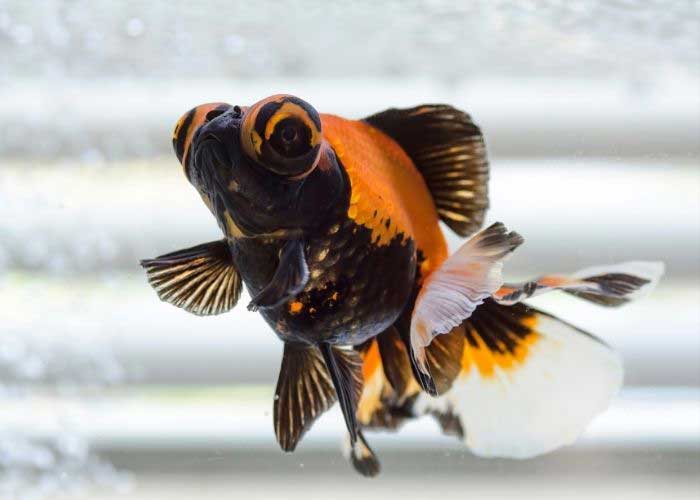
In the summer months, when the temperature rises, deeper ponds will provide a safe haven as the hot sun cannot penetrate too far below the water’s surface.
Outdoor ponds have another benefit which is to do with breeding. If you want to breed your goldfish, this usually happens in spring when the water temperature rises to around 68-74°F (20-23°C). A temperature rise like this will stimulate the reproductive hormone to induce breeding and encourage your goldfish to spawn.
You can mimic these natural temperature changes in your aquarium to induce goldfish breeding. Gently lower the aquarium water temperature in the winter months and increase the temperature slowly as spring sets in.
Do Goldfish Hibernate?
Goldfish go into a hibernation phase if they live in cold enough water. The hibernation phase is called Torpor, which isn’t a proper state of hibernation as goldfish are still semi-awake.
However, colder water temperatures dramatically slow their metabolic rate, so they require less oxygen and food, and they stay relatively still to conserve energy.
Can Goldfish Survive Winter?
Common goldfish are hardy fish that are more likely to survive winter in an outdoor pond, even in freezing temperatures. Common goldfish have been known to tolerate temperatures as low as 32-40°F (0-4°C).
Common goldfish will enter the state of Torpor (semi-hibernation), and as temperatures begin to rise in the springtime, they will become more active.
Deeper, larger bodies of water are less likely to freeze completely, and they will usually maintain a temperature slightly higher than outside of the water.
If the water begins to freeze over, you need to create a hole or break the ice to allow oxygen to enter the water. However, because the goldfish’s metabolism has slowed, it requires very little oxygen to survive.
Conclusion
So it appears that goldfish can survive quite happily at many different temperatures. The main concern for goldfish is that temperatures remain steady.
The best temperature for goldfish is consistent with most common tropical fish (at the higher end), making them ideal for most heated community tanks. These fish will also cope in a garden pond at the lower end of the temperature range.
Hopefully, this article has answered everything you need about the most suitable temperatures for goldfish.



